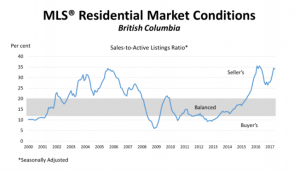 The British Columbia Real Estate Association (BCREA) reports that a total of 12,402 residential unit sales were recorded by the Multiple Listing Service® (MLS®) in May, down 7.9 per cent from the same period last year. Total sales dollar volume was $9.33 billion, down 4.0 per cent from May 2017. The average MLS® residential price in the province was $752,536, a 4.2 per cent increase from the same period last year.
The British Columbia Real Estate Association (BCREA) reports that a total of 12,402 residential unit sales were recorded by the Multiple Listing Service® (MLS®) in May, down 7.9 per cent from the same period last year. Total sales dollar volume was $9.33 billion, down 4.0 per cent from May 2017. The average MLS® residential price in the province was $752,536, a 4.2 per cent increase from the same period last year.
“Market conditions have tightened considerably this spring as an upturn in consumer demand has not been accompanied by a rise in homes listed for sale,” said Cameron Muir, BCREA Chief Economist. “The supply of homes for sale in the province has fallen 50 per cent over the past five years.”
“The entire southern portion of the province is experiencing a shortage of housing supply, which makes continuing upward pressure on home prices inevitable, at least in the near term,” added Muir. Total active listings in the province were down 11.1 per cent to 28,404 units from May 2016. The ratio of home sales to active listings was well over 20 per cent in nine of the province’s 11 real estate boards, and over 50 per cent in Vancouver, the Fraser Valley, Chilliwack and Victoria.
Year-to-date, BC residential sales dollar volume was down 25.2 per cent to $30.6 billion, when compared with the same period in 2016. Residential unit sales declined 20.1 per cent to 43,158 units, while the average MLS® residential price was down 5.7 per cent to $709,541.
For the complete news release, including detailed statistics, click here.
BC Real Estate Association Chief Economist Cameron Muir discusses the April 2017 statistics.
For the complete news release, including detailed statistics, click here.
 The British Columbia Real Estate Association (BCREA) reports that a total of 9,865 residential unit sales were recorded by the Multiple Listing Service® (MLS®) in April, down 23.9 per cent from the same period last year. Total sales dollar volume was $7.19 billion, down 25.4 per cent from April 2016. The average MLS® residential price in the province was $728,955, a 2 per cent decrease from the same period last year.
The British Columbia Real Estate Association (BCREA) reports that a total of 9,865 residential unit sales were recorded by the Multiple Listing Service® (MLS®) in April, down 23.9 per cent from the same period last year. Total sales dollar volume was $7.19 billion, down 25.4 per cent from April 2016. The average MLS® residential price in the province was $728,955, a 2 per cent decrease from the same period last year.
“BC home sales are on an upward trend this spring, led by a sharp increase in consumer demand in the Lower Mainland,” said Cameron Muir, BCREA Chief Economist. The seasonally adjusted annual rate (SAAR) of home sales was over 106,000 units in April, significantly above the five-year SAAR for April of 89,000 units.
The supply of homes for sale declined 17 per cent from April 2016. On a seasonally adjusted basis, active residential listings have declined 50 per cent since 2012 and are now at their lowest level in over 20 years. The imbalance between supply and demand is continuing to drive home prices higher in most regions, further eroding affordability.
Year-to-date, BC residential sales dollar volume was down 31.8 per cent to $21.3 billion, when compared with the same period in 2016. Residential unit sales declined 25.0 per cent to 30,757 units, while the average MLS® residential price was down 9.2 per cent to $692,220.
For the complete news release, including detailed statistics, click here.
February Home Sales Reflect Typical Consumer Demand
Vancouver, BC – March 15, 2017. The British Columbia Real Estate Association (BCREA) reports that a total of 6,580 residential unit sales were recorded by the Multiple Listing Service® (MLS®) in February, down 31.7 per cent from the same period last year. Total sales dollar volume was $4.53 billion, down 39.7 per cent from February 2016. The average MLS® residential price in the province was $688,117, an 11.7 per cent decrease from the same period last year.
“Consumer demand has returned to a more typical level over the first two months of the year,” says Cameron Muir, BCREA Chief Economist. “While the home sales have declined nearly 32 per cent from the extraordinary performance of a year ago, last month’s activity reflected the average for the month February since the year 2000.”
The average MLS® residential price for the province was down nearly 12 per cent from a record $779,419 in February 2016. However, this change is largely the result of a decline in the proportion of provincial sales originating from the Vancouver region. Last month, 37 per cent of BC home sales occurred in the Real Estate Board of Greater Vancouver’s area, compared to 44 per cent in February 2016.
Year-to-date, BC residential sales dollar volume was down 38.5 per cent to $7.3 billion, when compared with the same period in 2016. Residential unit sales declined 28.5 per cent to 11,067 units, while the average MLS® residential price was down 14.1 per cent to $660,943.
For more information go to BCREA
 The Bank of Canada announced this morning that it is holding the target for its overnight rate at 0.5 per cent. In the press release accompanying the decision, the Bank noted that economic growth has been faster than previously expected, boosted by what the Bank sees as temporary spending from the oil and gas recovery and a boost to consumer spending by the Canada Child Benefit. However, export growth remains challenged and business investment is low. Therefore, the Bank judges that it is too early to conclude that the economy has turned a corner. In addition, CPI inflation is trending below its 2 per cent target while the Bank’s three new measures of core inflation continue to drift lower.
The Bank of Canada announced this morning that it is holding the target for its overnight rate at 0.5 per cent. In the press release accompanying the decision, the Bank noted that economic growth has been faster than previously expected, boosted by what the Bank sees as temporary spending from the oil and gas recovery and a boost to consumer spending by the Canada Child Benefit. However, export growth remains challenged and business investment is low. Therefore, the Bank judges that it is too early to conclude that the economy has turned a corner. In addition, CPI inflation is trending below its 2 per cent target while the Bank’s three new measures of core inflation continue to drift lower.
That downward trending inflation, along with uncertainty in United States policy, seems to be the main barriers keeping the Bank from raising its benchmark overnight rate. While there is some remaining slack in the economy, as measured by the output gap, the Canadian economy has been growing well above the Bank’s estimate of potential growth (1.5 per cent) for three consecutive quarters including a first quarter 2017 in which available data points to above 4 per cent growth. In addition to strong GDP numbers, the economy is adding jobs at a rate of 35,000 per month over the past six months, the highest level of job growth since 2010. Should this momentum continue, it is likely we will begin to see a more hawkish Bank of Canada in the second half of the year and a first rate increase in early 2018.
For more information go to BCREA
BC Real Estate Association (BCREA) Chief Economist Cameron Muir discusses the December 2016 statistics.
BC Home Sales Post Record Year
Vancouver, BC – January 13, 2017. The British Columbia Real Estate Association (BCREA) reports that a record 112,209 residential unit sales were recorded by the Multiple Listing Service® (MLS®) in 2016, an increase of 9.5 per cent from the previous year. Total sales dollar volume was a record $77.6 billion, up 18.8 per cent from 2015. The average MLS® residential price in the province climbed 8.6 per cent to $691,144 on an annual basis in 2016.

“Broad-based consumer demand driven by strong economic conditions, employment growth, consumer confidence, and an expanding population base pushed home sales to record levels in many BC regions last year,” said Cameron Muir, BCREA Chief Economist. “However, home sales have fallen back from their lofty peaks early last year.” The seasonally adjusted annual rate of sales activity was approximately 92,000 units in December.
A total of 4,721 residential unit sales were recorded by the MLS® in December, down 28.4 per cent from the same month last year. Total sales dollar volume was $3.1 billion last month, a decline of 33.1 per cent compared to the same month the previous year. The average MLS® residential price in the province was $654,699 in December, a 6.6 per cent decline from December 2015.
BC Real Estate Association (BCREA) Chief Economist Cameron Muir discusses the September 2016 statistics.
BC Home Sales Reflect Regional Demand Variations
Vancouver, BC – October 14, 2016. The British Columbia Real Estate Association (BCREA) reports that 7,591 residential unit sales were recorded by the Multiple Listing Service® (MLS®) in September, down 11.2 per cent from the same month last year. Total sales dollar volume was $4.45 billion in September, down 14.1 per cent compared to the previous year. The average MLS® residential price in the province was $585,844, a decline of 3.2 per cent compared to the same month last year.
“Housing demand in the province continued to trend lower in September,” said Cameron Muir, BCREA Chief Economist. “While Vancouver, Fraser Valley and the North experienced year-over-year declines last month, the rest of the province posted an increase in the number of residential transactions.”
“The average residential price in the province continued to reflect a change in the composition and location of homes sold,” added Muir. “However, the effect was less pronounced in September than in August, when detached home sales fell to just 28 per cent of total demand in Vancouver.”
Year-to-date, BC residential sales dollar volume increased 33.5 per cent to $66 billion, when compared with the same period in 2015. Residential unit sales climbed by 18.5 per cent to 93,797 units, while the average MLS® residential price was up 12.7 per cent to $703,986.





